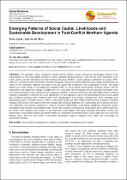| dc.description.abstract | This qualitative study, conducted in Oyam district northern Uganda, presents an ethnographic analysis of the
transformation of the social capital available to former internally displaced persons (IDPs) by the Lords’ Resistance Army
(LRA) conflict, and the implications for their livelihood strategies. Northern Uganda suffered a protracted two decade (1986-
2006) civil war between the LRA and Government of Uganda. Forced conscription, abduction and eventual displacement into
camps by the combatants shattered the mutual trusts and capital that communities had accumulated overtime. This paper
applied case study design to investigate the emerging forms of social capital among former displaced persons and the
respondents were purposively selected. In-depth interviews were held with Government civil servants and local leaders while
focus group discussions were conducted with community members to explore opinions on the after-displacement livelihood
strategies. Sustainable livelihoods and social capital theories were applied to analyse the relationship between social capital
and livelihood resilience upon returning home from displacement. The findings indicated that while emerging from
displacement, family members moved in phases with family heads and elder children returning first to prepare livelihood
strategies. Both positive and negative networks emerged that influenced preference for social groups and livelihood activities.
The established social groups comprised of ‘doggola’ (kinship) relationships, wage-labour, neighbours, friendship, alcohol
consumption and informal social support groups. Despite the dynamics experienced in social capital and livelihood activities,
the former IDPs modified and reverted to the traditional social capital. This paper concludes that amidst conflict and
displacement, social capital sustains household welfare and community development hence, social capital does not vanish but
changes forms. Thus, the post-conflict reconstruction programme ought to integrate social capital into its package for
sustainability purpose. | en_US |

